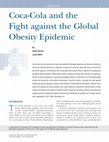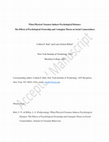Papers by Laura Schrier Rifkin
ACR North American Advances, 2020

Thunderbird International Business Review, 2017
Coca-Cola, the century-old iconic brand associated with bringing happiness and harmony, is facing... more Coca-Cola, the century-old iconic brand associated with bringing happiness and harmony, is facing an ethical and fi nancial dilemma as it attempts to balance its corporate needs with those of society. The soft drink industry as a whole, and Coke in particular, has received harsh criticism for contributing to the global obesity epidemic. Rising health concerns among consumers have resulted in a continuous decline in soda consumption in some key international markets. Considered one of the leading global brands and among the most admired corporations, Coca-Cola claims it supports the fi ght against obesity, sponsoring campaigns, research, and initiatives to promote physical activities. However, critics assert the company has used deception and undue infl uence to dismiss the harmful effects of soda, similar to the tactics of the tobacco industry. Forced to respond to mounting criticism, Coca-Cola must navigate between meeting shareholder demands and maintaining its reputation as a socially responsible organization.

Journal of Consumer Research
The Peer-to-Peer sector of the sharing economy relies on reputation systems through which consume... more The Peer-to-Peer sector of the sharing economy relies on reputation systems through which consumers and providers review each other. Whereas prior research has examined the effects of reviews by consumers on providers and firms, this research examines, for the first time, a turn of the tables in which consumers are evaluated. Across a pilot and seven studies (five preregistered), using multiple actual behaviors and sharing contexts, results reveal that a negative review of the consumer from the peer provider leads to negative word of mouth (NWOM) about the platform. Drawing from psychological contract theory, the research demonstrates that this effect is mediated by consumers’ perceived betrayal by the platform. Two sets of moderators are identified. The first set establishes that a breach of consumers’ psychological contract with the platform underlies the effect. In the second set, platform policies that may render a breach more or less consequential intensify or mitigate consumer...
The SAGE Handbook of Social Media Marketing

Journal of Consumer Behaviour, 2021
This research examines the effect of a contagion threat on consumers' social connectedness. Acros... more This research examines the effect of a contagion threat on consumers' social connectedness. Across two experiments, we show that when consumers are near others in public places during a pandemic (but not before or after), they psychologically distance themselves by perceiving lower social connectedness. This reduction in social connectedness is higher when consumers have more (vs. less) psychological ownership of the public place (Study 1). Further, the negative effect of psychological ownership on social connectedness found during (but not after) a pandemic is attenuated when consumers do not believe the disease is a severe threat to their own health (Study 2). We examine downstream effects by illustrating that both individual psychological ownership and social connectedness contribute to collective psychological ownership, which in turn enhances stewardship of the public place. The interacting effects of a contagion threat and psychological ownership on stewardship are not explained by territorial infringement, self-esteem, perceived crowding, positive or negative affect, hope or nostalgia.
Journal of Business Research, 2020
In this research, we document some of the many unusual consumer behavior patterns that came to do... more In this research, we document some of the many unusual consumer behavior patterns that came to dominate the early days of the COVID-19 pandemic. We offer insights based on theory to help explain and predict these behaviors and associated outcomes in order to inform future research and marketing practice. Taking an environmentally-imposed constraints point of view, we examine behaviors during each of three phases: reacting (e.g., hoarding and rejecting), coping (e.g. maintaining social connectedness, do-it-yourself behaviors, changing views of brands) and longer-term adapting (e.g. potentially transformative changes in consumption and individual and social identity). We discuss implications for marketing researchers and practice.
Boundary Blurred: A Seamless Customer Experience in Virtual and Real Spaces, 2018











Uploads
Papers by Laura Schrier Rifkin